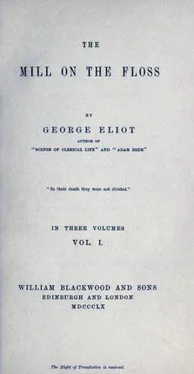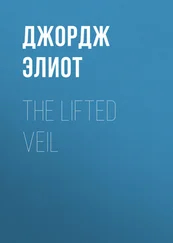"Why! you don't remember Bob, then, as you gen the pocket-knife to, Mr. Tom?"
The rough-handled pocket-knife was taken out in the same moment, and the largest blade opened by way of irresistible demonstration.
"What! Bob Jakin?" said Tom, not with any cordial delight, for he felt a little ashamed of that early intimacy symbolized by the pocket-knife, and was not at all sure that Bob's motives for recalling it were entirely admirable.
"Ay, ay, Bob Jakin, if Jakin it must be, 'cause there's so many Bobs as you went arter the squerrils with, that day as I plumped right down from the bough, and bruised my shins a good un — but I got the squerril tight for all that, an' a scratter it was. An' this littlish blade's broke, you see, but I wouldn't hev a new un put in, 'cause they might be cheatin' me an' givin' me another knife instid, for there isn't such a blade i' the country, — it's got used to my hand, like. An' there was niver nobody else gen me nothin' but what I got by my own sharpness, only you, Mr. Tom; if it wasn't Bill Fawks as gen me the terrier pup istid o' drowndin't it, an' I had to jaw him a good un afore he'd give it me."
Bob spoke with a sharp and rather treble volubility, and got through his long speech with surprising despatch, giving the blade of his knife an affectionate rub on his sleeve when he had finished.
"Well, Bob," said Tom, with a slight air of patronage, the foregoing reminscences having disposed him to be as friendly as was becoming, though there was no part of his acquaintance with Bob that he remembered better than the cause of their parting quarrel; "is there anything I can do for you?"
"Why, no, Mr. Tom," answered Bob, shutting up his knife with a click and returning it to his pocket, where he seemed to be feeling for something else. "I shouldn't ha' come back upon you now ye're i' trouble, an' folks say as the master, as I used to frighten the birds for, an' he flogged me a bit for fun when he catched me eatin' the turnip, as they say he'll niver lift up his head no more, — I shouldn't ha' come now to ax you to gi' me another knife 'cause you gen me one afore. If a chap gives me one black eye, that's enough for me; I sha'n't ax him for another afore I sarve him out; an' a good turn's worth as much as a bad un, anyhow. I shall niver grow down'ards again, Mr. Tom, an' you war the little chap as I liked the best when I war a little chap, for all you leathered me, and wouldn't look at me again. There's Dick Brumby, there, I could leather him as much as I'd a mind; but lors! you get tired o' leatherin' a chap when you can niver make him see what you want him to shy at. I'n seen chaps as 'ud stand starin' at a bough till their eyes shot out, afore they'd see as a bird's tail warn't a leaf. It's poor work goin' wi' such raff. But you war allays a rare un at shying, Mr. Tom, an' I could trusten to you for droppin' down wi' your stick in the nick o' time at a runnin' rat, or a stoat, or that, when I war a-beatin' the bushes."
Bob had drawn out a dirty canvas bag, and would perhaps not have paused just then if Maggie had not entered the room and darted a look of surprise and curiosity at him, whereupon he pulled his red locks again with due respect. But the next moment the sense of the altered room came upon Maggie with a force that overpowered the thought of Bob's presence. Her eyes had immediately glanced from him to the place where the bookcase had hung; there was nothing now but the oblong unfaded space on the wall, and below it the small table with the Bible and the few other books.
"Oh, Tom!" she burst out, clasping her hands, "where are the books? I thought my uncle Glegg said he would buy them. Didn't he? Are those all they've left us?"
"I suppose so," said Tom, with a sort of desperate indifference. "Why should they buy many books when they bought so little furniture?"
"Oh, but, Tom," said Maggie, her eyes filling with tears, as she rushed up to the table to see what books had been rescued. "Our dear old Pilgrim's Progress that you colored with your little paints; and that picture of Pilgrim with a mantle on, looking just like a turtle — oh dear!" Maggie went on, half sobbing as she turned over the few books, "I thought we should never part with that while we lived; everything is going away from us; the end of our lives will have nothing in it like the beginning!"
Maggie turned away from the table and threw herself into a chair, with the big tears ready to roll down her cheeks, quite blinded to the presence of Bob, who was looking at her with the pursuant gaze of an intelligent dumb animal, with perceptions more perfect than his comprehension.
"Well, Bob," said Tom, feeling that the subject of the books was unseasonable, "I suppose you just came to see me because we're in trouble? That was very good-natured of you."
"I'll tell you how it is, Master Tom," said Bob, beginning to untwist his canvas bag. "You see, I'n been with a barge this two 'ear; that's how I'n been gettin' my livin',—if it wasn't when I was tentin' the furnace, between whiles, at Torry's mill. But a fortni't ago I'd a rare bit o' luck, — I allays thought I was a lucky chap, for I niver set a trap but what I catched something; but this wasn't trap, it was a fire i' Torry's mill, an' I doused it, else it 'ud set th' oil alight, an' the genelman gen me ten suvreigns; he gen me 'em himself last week. An' he said first, I was a sperrited chap, — but I knowed that afore, — but then he outs wi' the ten suvreigns, an' that war summat new. Here they are, all but one!" Here Bob emptied the canvas bag on the table. "An' when I'd got 'em, my head was all of a boil like a kettle o' broth, thinkin' what sort o' life I should take to, for there war a many trades I'd thought on; for as for the barge, I'm clean tired out wi't, for it pulls the days out till they're as long as pigs' chitterlings. An' I thought first I'd ha' ferrets an' dogs, an' be a rat-catcher; an' then I thought as I should like a bigger way o' life, as I didn't know so well; for I'n seen to the bottom o' rat-catching; an' I thought, an' thought, till at last I settled I'd be a packman, — for they're knowin' fellers, the packmen are, — an' I'd carry the lightest things I could i' my pack; an' there'd be a use for a feller's tongue, as is no use neither wi' rats nor barges. An' I should go about the country far an' wide, an' come round the women wi' my tongue, an' get my dinner hot at the public, — lors! it 'ud be a lovely life!"
Bob paused, and then said, with defiant decision, as if resolutely turning his back on that paradisaic picture:
"But I don't mind about it, not a chip! An' I'n changed one o' the suvreigns to buy my mother a goose for dinner, an' I'n bought a blue plush wescoat, an' a sealskin cap, — for if I meant to be a packman, I'd do it respectable. But I don't mind about it, not a chip! My yead isn't a turnip, an' I shall p'r'aps have a chance o' dousing another fire afore long. I'm a lucky chap. So I'll thank you to take the nine suvreigns, Mr. Tom, and set yoursen up with 'em somehow, if it's true as the master's broke. They mayn't go fur enough, but they'll help."
Tom was touched keenly enough to forget his pride and suspicion.
"You're a very kind fellow, Bob," he said, coloring, with that little diffident tremor in his voice which gave a certain charm even to Tom's pride and severity, "and I sha'n't forget you again, though I didn't know you this evening. But I can't take the nine sovereigns; I should be taking your little fortune from you, and they wouldn't do me much good either."
"Wouldn't they, Mr. Tom?" said Bob, regretfully. "Now don't say so 'cause you think I want 'em. I aren't a poor chap. My mother gets a good penn'orth wi' picking feathers an' things; an' if she eats nothin' but bread-an'-water, it runs to fat. An' I'm such a lucky chap; an' I doubt you aren't quite so lucky, Mr. Tom, — th' old master isn't, anyhow, — an' so you might take a slice o' my luck, an' no harm done. Lors! I found a leg o' pork i' the river one day; it had tumbled out o' one o' them round-sterned Dutchmen, I'll be bound. Come, think better on it, Mr. Tom, for old 'quinetance' sake, else I shall think you bear me a grudge."
Читать дальше












